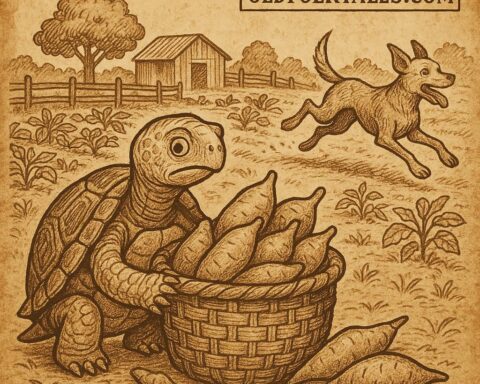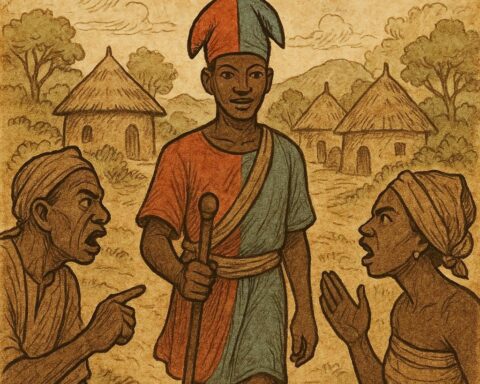Hear this tale, children, for it has been carried in the voices of our fathers and mothers, told by the fireside when the moon shines bright and the night drums echo. It is the tale of a palm wine tapper and the clever but greedy Tortoise, the one we call Àjàpá, whose tricks have both amused and angered the world.
Long ago, in a village not far from the thick forest, there lived a hardworking palm wine tapper named Ojo. Every morning, before the cock crowed, Ojo would climb the tallest palm trees with his rope, knife, and calabash. He cut the tree’s mouth gently, sang to the spirits of the tree, and collected the sweet juice that flowed out like the blessing of the gods. By evening, his calabashes were full, and he shared the drink with his neighbors, always fair and generous.
Now, news of Ojo’s skill reached Tortoise, the trickster who was never content with his own lot. Àjàpá was small and slow, but his mind was sharper than a hunter’s spear. He thought, “Why should I toil when I can enjoy Ojo’s wine with just a little cunning?”
One evening, as Ojo carried his calabash back to the village, Tortoise limped out from the bushes. “Brother Ojo!” he called with his smooth voice. “You look tired. Surely you cannot finish all this wine alone. Why not share with me, your humble friend?”
Ojo, who was kind, gave him a small cup. Tortoise drank greedily and smacked his lips. “Ah! This is the sweetest wine I have ever tasted. You are blessed, Ojo.” But in his heart, Àjàpá plotted. He wanted not just a cup, but the whole calabash.
The next morning, before dawn, Tortoise sneaked to the forest and tied himself with a rope. He climbed halfway up the palm tree and began tapping like Ojo. But Tortoise was clumsy. He cut the tree too deep, and instead of sweet sap, the bitter white froth of the palm spilled out. When Ojo arrived and saw the mess, he frowned. “Àjàpá! This is not your work. Why are you here?”
But Tortoise only laughed and said, “The wine belongs to the forest. Whoever can climb the tree deserves to drink.”
Ojo shook his head. “If you want to drink, come when I pour it. Do not steal.”
Àjàpá pretended to agree, but his tricks did not end there. That evening, when Ojo hung his calabash high in the tree to let the wine ferment, Tortoise returned with his family. One by one, his wife, his children, even his cousins climbed the rope and drank until the calabash was empty. When Ojo came to collect it, he found nothing but dregs.
He was angry but patient. “The ancestors will judge you, Àjàpá,” he warned.
Yet Tortoise was not done. One day, when the villagers gathered for a festival, Ojo brought a large gourd of his finest wine. Everyone sang, danced, and clapped their hands. But just as Ojo raised the gourd, Tortoise waddled in. “Brothers and sisters!” he cried. “This wine is mine! Did I not climb the tree? Did I not risk my shell for this drink?”
The crowd murmured. Some believed him, for his tongue was sweet like honey. But Ojo raised his voice. “Let us ask the gods for judgment.”
The elders gathered. They poured libation, and the diviner cast the cowries. The shells spoke clearly: “The palm wine belongs to Ojo, for he works with patience and respect. Àjàpá seeks only to deceive.”
The villagers shouted in anger at Tortoise. To punish him, they made him drink calabash after calabash of sour, unripe palm juice until his belly was round and heavy. He stumbled, fell, and cracked his shell. From that day, the tortoise’s shell has lines and cracks, a reminder of his greed and foolishness.
And so, children, Ojo continued his work, respected by all. His wine flowed like blessings, and he never allowed bitterness to dwell in his heart.
Moral of the Folktale: The Palm Wine Tapper and the Trickster Tortoise
The story teaches us that patience and honesty bring respect and lasting rewards, while greed and trickery bring shame and punishment. Just like Ojo, we must value hard work and fairness, for these virtues bring honor to a person’s name.
Knowledge Check
What is the moral of the folktale ‘The Palm Wine Tapper and the Trickster Tortoise’?
The tale shows that patience and honesty bring lasting rewards, while greed and deceit bring shame.What cultural group does the tale ‘The Palm Wine Tapper and the Trickster Tortoise’ come from?
This tale comes from the Yoruba people of West Africa, known for their rich oral storytelling traditions.In the tale, what action sets the story of ‘The Palm Wine Tapper and the Trickster Tortoise’ in motion?
The story begins when Tortoise tastes Ojo’s palm wine and decides to trick him to get more.How does the folktale ‘The Palm Wine Tapper and the Trickster Tortoise’ explain a natural feature or animal trait?
It explains why the tortoise’s shell is cracked today, said to be from falling after drinking too much sour palm wine.Is ‘The Palm Wine Tapper and the Trickster Tortoise’ considered a trickster tale, ghost story, or moral fable?
It is a trickster tale and moral fable, as it combines Tortoise’s cunning with a lesson about greed.How is this folktale relevant to modern readers?
It remains relevant because it warns against greed, dishonesty, and selfishness, reminding us that fairness and humility still matter in today’s world.Cultural Origin: Yoruba Folktales






